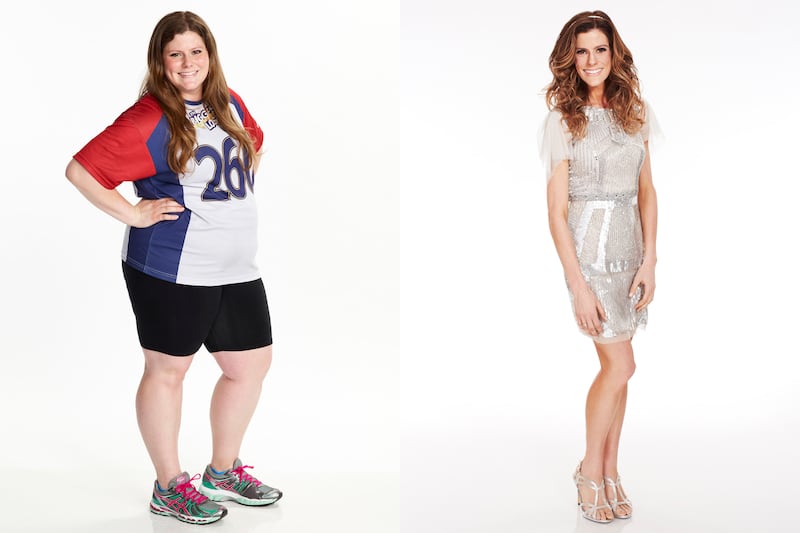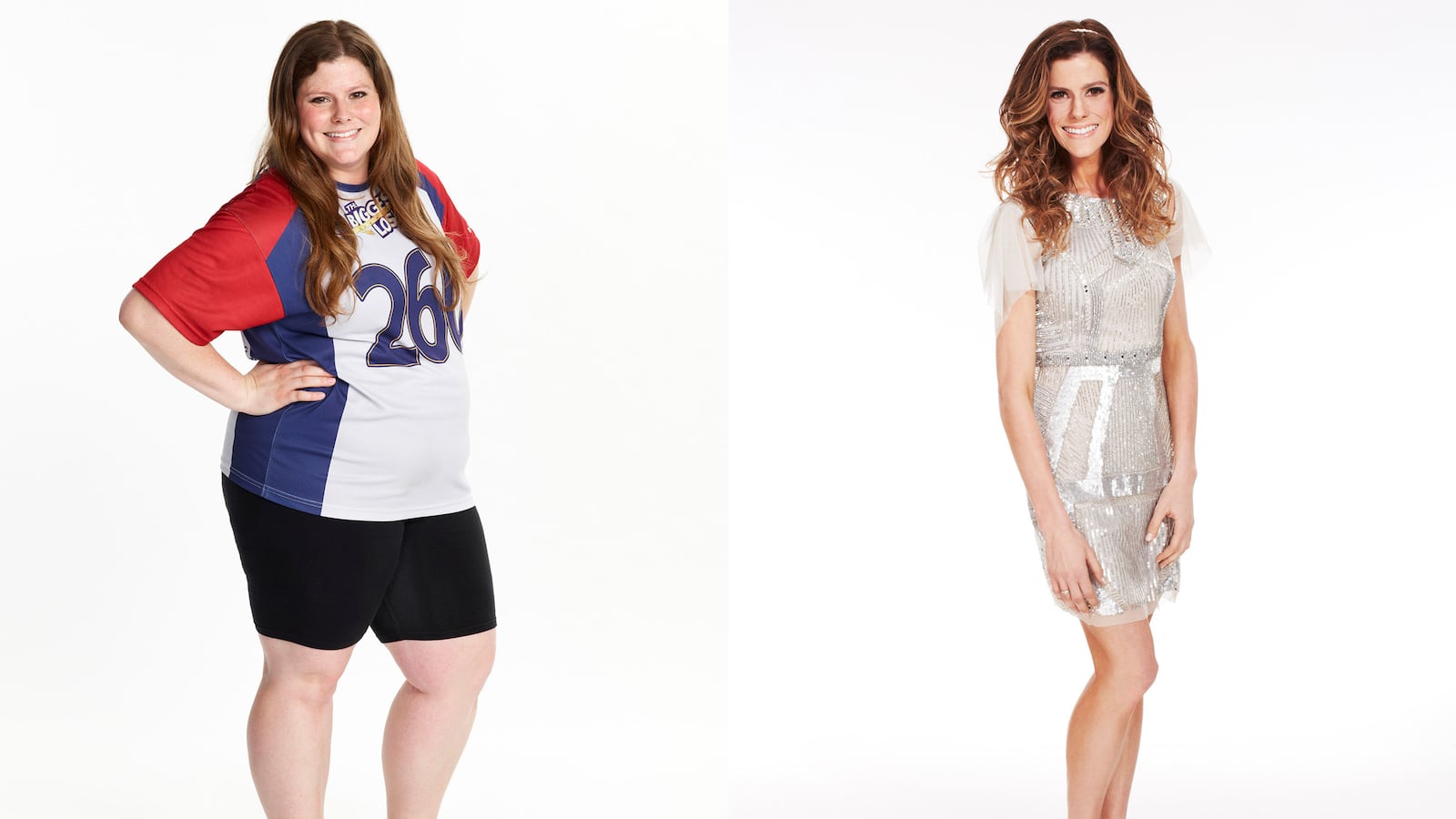When it comes to their bodies, women can’t win. That’s the takeaway from this week’s finale of The Biggest Loser when Rachel Frederickson glided on stage 155 pounds lighter than when she began the contest. Though the show’s entire premise is based on losing an extreme amount of weight in a short period of time, the American public was shocked—shocked!— when one of those contestants actually managed to do exactly that.

As she floated on stage, social media erupted with accusations of eating disorders, mental illness, and bad judgment on the part of the show’s producers. Two of the show’s trainers Bob Harper and Jillian Michaels’ reactions (Michaels was literally agog when Frederickson appeared) were analyzed as being “mortified” by viewers.
Everyone had an opinion about Frederickson’s body.
One person Tweeted:“it's not health or fitness. There is no muscle mass or tone 2 this poor skeleton. I dn't think BL was about that!”
Another wrote: “Rachel just looks so sickly.”
Jacob Ward tweeted: “The Biggest Loser winner is the very picture of anorexia, an affliction whose lifeblood is attention. Nice job, NBC. “
Even Harper said he was “stunned” by her weight loss.
At 5 foot 5 inches and 105 pounds, Frederickson’s is slightly below the recommended BMI. But she’s also small-boned and lithe. And, let’s not forget, she’s trying to win a lot of money—$250,000—so perhaps she pushed herself a little harder to get the green. (She admitted in follow up interviews that in addition to using a standup desk with a treadmill, she exercised up to four times a day.)
But again, said body image expert, Claire Mysko, author of You’re Amazing! A No-Pressure Guide To Being Your Best Self and Does This Pregnancy Make Me Look Fat? The Essential Guide to Loving Your Body Before and After Baby, nobody can be an expert on Frederickson’s health except her doctor.
“It is impossible to get an accurate picture of Frederickson’s physical and mental health just by sizing her up. Her health should be a matter between her and her doctor,” she said. “And that's one of many problems with The Biggest Loser. The show encourages toxic public scrutiny of people's bodies and uninformed speculation about who is healthy and who isn't.”
And more to the point, it’s really none of our business. That women’s bodies have been other people’s business for a while is no secret—the debate around abortion and birth control is as much about whether or not women have the right to do things with their bodies without men’s explicit permission as it is about unborn babies and fetuses—but in this age of celebrity magazines and reality TV, the scrutiny on women’s physicality is tenfold. Baby bumps are celebrated so long as that post-baby weight gain is shed nearly immediately, otherwise expect an unending narrative in US Weekly or Star about how a star can’t lose the baby fat and her career, marriage, and life are falling apart as a result. When someone like Christina Aguilera or Jessica Simpson struggles with their weight, or even just deigns to look normal, they are vilified.
“Women live with constant pressure to get it just right,” said Mysko. “I think we're at an interesting cultural moment when women have had it with the brutally narrow Hollywood standards and the glorification of thinness, which has led to an encouraging amount of push back. “
Even articles that purport to be about revealing media’s false images of women, like Jezebel’s $10,000 reward for un-retouched images of Lena Dunham’s Vogue photo shoot can have negative repercussions. Is the “proof” showing that she’s not that bad looking, or that the tweaking helped her? Beauty is in the eye of the beholder and unfortunately, on the Internet, everyone has a public platform from which to fat shame and body-snark. The world no longer needs beauty pageants to play armchair judge and critique women’s appearance; they just need to click on a website or turn on the TV.
“I've seen firsthand how eye-opening it is for young people to see what can be achieved through Photoshop and how far the media fantasy of beauty is from anything that is attainable in reality,” said Mysko, who has served as the director of the America Anorexia Bulimia Association. “However, I think we also have to recognize that when a critique of the industries that profit from promoting these digital illusions turns into collective scrutiny and/or concern trolling of individual women's bodies, we've crossed into damaging territory. That line is undoubtedly tricky to navigate.”
And weirdly, Frederickson’s biggest crime wasn’t that she lost a large amount of weight; it’s that she lost so much that she resembles a Hollywood actress or model— which is threatening to everyone who is not a Hollywood actress or model. It triggers women’s inner Mean Girl—being that thin is only okay for Hollywood actresses and models, but not for real women. Real women are supposed to look like Lena Dunham, except of course Lena Dunham, who, because she is on TV, is deemed too fat and disgusting to be naked all the time.
This is why women of all shapes can’t win. Call it body policing, body snarking, concern trolling. Whatever it is, women’s bodies are the public’s business in a way that men’s bodies are not. “What about the other contestants on the show?,” asks Mysko. “If a male contestant had lost an extreme amount of weight, the ‘is it an eating disorder?’ alarm might not have been sounded so quickly, or maybe not at all, because the stereotype persists that eating disorders are white women's issues.”
Shows like The Biggest Loser also only help to perpetuate the notion that thin equals healthy, even though the rate that the contestants lose weight is alarming—most experts recommend two pounds per week. “The Biggest Loser is about excess and extremes; it's not about health,” said Mysko.
It’s not the first time the show has come under scrutiny—season three contestant Kai Hibberd (who came in second place) has been vocal about how the contestants were actually urged to ignore the advice of doctors; Australian contestant Andrew Costello said that three quarters of the contestants gain their weight back. The show’s “extreme weight loss tactics, the dramatic shouting and shaming that The Biggest Loser banks on, are potentially triggering to anyone who is vulnerable to disordered eating,” Mysko said.
Mysko said shows like The Biggest Loser also perpetuate the notion that, “Body size is assumed to be solely a matter of personal responsibility and will power,” when in many cases, it’s simply not true. Genetics, environmental factors, and other variables contribute to weight gain and eating disorders.
In the end, the weight loss industrial complex is just that—a business. Seizing on people’s insecurities about their looks, their weight, pushing diets and fads, moves products, magazines, diet programs, and improves ratings. The Biggest Loser is part of that business—the show sells Biggest Loser-branded exercise resort vacations, boot camps, diet foods, DVDs and more.
As Mysko said: “Why the fluctuating body standards for women? Women spend billions on diets and other beauty products in our attempts to hit that moving target of perfection. If it stopped moving, we might stop spending.”
And you can’t have that.





